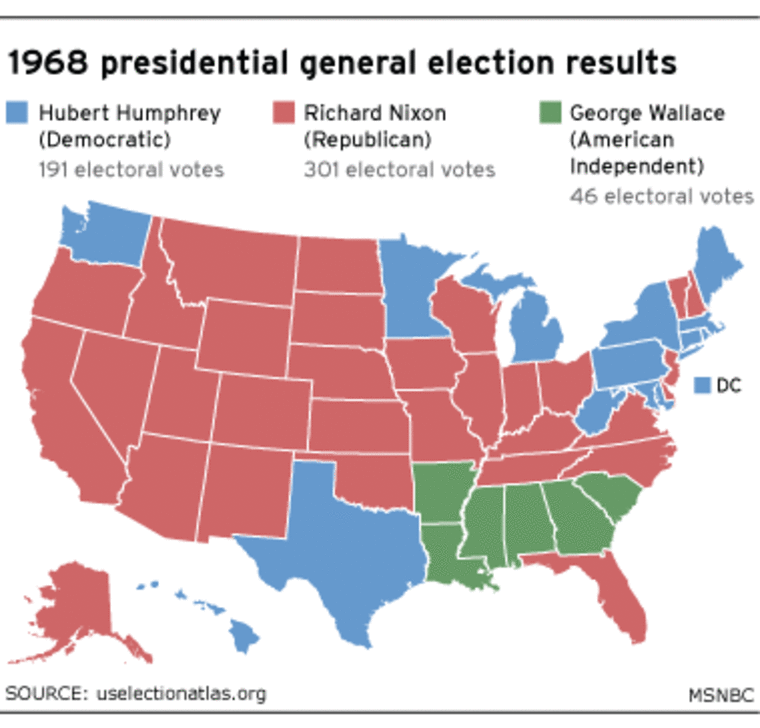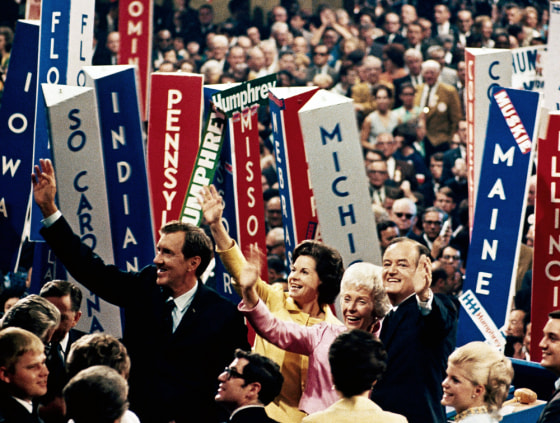The 1968 presidential campaign was so traumatic that a mere timeline can’t come close to recapturing the feel of it.
The drama unfolded in several acts of staggering succession:
- The Tet Offensive, a ferocious assault by Communist soldiers on U.S. military forces in Vietnam
- President Lyndon Johnson’s sudden decision to not run for re-election
- The assassinations of civil rights crusader Dr. Martin Luther King, Jr. and Democratic presidential contender Sen. Robert Kennedy
- Riots on the streets of Chicago at the Democratic National Convention which left the party torn asunder
In the end, it was the candidate of conservatism and stability, Republican Richard Nixon, who was elected president.
The year started with the Tet Offensive in South Vietnam, where 500,000 U.S. troops were desperately trying to save the anti-communist government. The Communist armies lost an estimated 58,000 men, but scored a propaganda victory.
“It was a turning point in the war,” said Johnson’s secretary of defense, Clark Clifford. “Its size and scope made mockery of what the American military had told the public about the war, and devastated administration credibility.”
In Tet’s aftermath, Johnson struggled to build support for sending more troops to Vietnam.
Johnson's pessimism over war
“We need more taxes — in an election year,” he told his generals on March 26, 1968. “We need more troops — in an election year. We need cuts in the domestic budget — in an election year. And yet I cannot tell the people what they will get in Vietnam in return for these cuts. We have no support for the war.”
At that point in the war, nearly 20,000 U.S. soldiers had been killed. And nearly 500 were dying in combat every week.
In the New Hampshire primary on Feb. 12, Johnson faced anti-war candidate Sen. Eugene McCarthy of Minnesota, who alone dared to challenge the president.
McCarthy won 42 percent of the vote, a humiliation for Johnson.
Four days later, Kennedy, another opponent of the war, jumped in the race. Critics called him an opportunist.
Kennedy said he’d assured McCarthy “that my candidacy would not be in opposition to his, but in harmony.”
But only one man could end up winning the nomination, and in the end neither McCarthy nor Kennedy would be the one.
And it wasn't Johnson.
Two weeks after Kennedy joined the race, Johnson summoned Clifford to the White House and showed him the closing lines of a speech he was to deliver on his efforts to negotiate an end to the war.
“Nothing in my career ever surprised me so much as what I read,” Clifford said.
A shock from Johnson
On the sheet of paper Johnson handed Clifford were written the words with which Johnson would end his March 31 speech, “I shall not seek, and I will not accept the nomination of my party for another term as your president.”
Four days later, a sniper shot King to death in Memphis, sparking riots in the nation’s capital and more than 100 other cities across the nation.
Then on June 5, moments after claiming victory in the California primary, Kennedy was gunned down in Los Angeles.

While Kennedy and McCarthy had been battling for the Democratic nomination, Vice President Hubert Humphrey also entered the race.
Humphrey left the primary battles to his two rivals, while he recruited party chieftains who has controlled some of the state delegations to the convention — enough delegations, as it turned out for Humphrey to win the nomination.
Third-party candidate George Wallace of Alabama posed a threat to both Nixon and Humphrey. His strategy was to deny either Nixon or Humphrey the Electoral College majority of 270, thus forcing the contest into the House of Representatives where Wallace could bargain for concessions.
The pugnacious populist
Wallace was a pugnacious populist who had expanded beyond his base of segregationists opposed to the civil rights movement of the 1960s.
He railed against “federal judges playing God,” “pseudo-intellectuals,” and newspaper editors “who have looked down their noses long enough at the average man on the street.”
Referring to anti-war demonstrators who had lain down in front of Johnson’s presidential limousine, forcing it to stop, Wallace said when he became president he’d order the limo to keep going.
In the Republican contest, Nixon had outlasted challengers Michigan Gov. George Romney (father of Mitt) and New York Gov. Nelson Rockefeller.
At the Republican convention in Miami Beach, Nixon had to contend with late entrant to the fray: California Gov. Ronald Reagan, conservative darling.
But South Carolina Sen. Strom Thurmond, himself a presidential candidate in 1948, helped save Nixon.
If we want to win, Thurmond told his fellow Southern delegates, we have no choice but Nixon. “We must quit using our hearts and start using our heads. I love Reagan, but Nixon’s the one,” Thurmond said.
In his speech to the convention, Nixon blamed Democrats for the Vietnam debacle.
“Never has so much military and economic and diplomatic power been used so ineffectively,” he declared. “The time has come for the American people to turn to new leadership not tied to the mistakes and policies of the past.”
He pledged that he’d seek “an honorable end to the war in Vietnam.”
Agnew: Democrat 'soft on communism'
As his running mate, Nixon chose the governor of Maryland, Spiro Agnew, who had reputation as a tough "law and order" advocate.
Agnew’s off-the-cuff comments soon made him famous: he called Humphrey “soft on communism and soft on law and order” and for good measure called Humphrey’s stance on the Vietnam War “squishy soft.”
Humphrey was trying to find a way to distance himself from Johnson, the war’s architect.
In late September he delivered a speech in which he pledged to stop the bombing of North Vietnam “as an acceptable risk for peace” in hopes that it would spur serious war-ending negotiations.
Nixon brushed off Humphrey’s call for a televised debate among the three candidates, accusing him of trying to “build up Mr. Wallace to defeat the Republicans where he himself cannot do so” — in the South.
He described Wallace as Humphrey’s “secret weapon.” The more prominence Humphrey gave Wallace, Nixon said, the more votes Wallace would siphon from the Republican ticket.
On Election Day, Nov. 5, the South, solidly Democratic for most of the previous 80 years, was split.
Nixon took the Carolinas, Virginia, Tennessee, and Florida.
Wallace won three states that Thurmond had won in 1948 (Louisiana, Mississippi, and Alabama), and added two more, Georgia and Arkansas.
But he did not come close to winning any state outside Dixie. He did get 12 percent of the vote in Ohio and 15 percent in Genesee County, Michigan, home to union members who worked at the General Motors plant in Flint.
Nixon wins from Ohio to the Pacific
Nixon ran the Electoral College table from Ohio all the way to the Pacific Coast.
Humphrey dominated the Northeast and was able to hold his home state of Minnesota and Michigan, as well as Texas (thanks to Johnson).
Apart from those three, he failed to win any states from the Appalachians to California.
Humphrey blamed his loss partly on McCarthy, who only endorsed him just a week before the election and only then with a distinct lack of enthusiasm.
McCarthy had a fervent following in California, Ohio, Illinois and New Jersey where, Humphrey wrote in his memoirs, “a united party working in my behalf might have changed the electoral outcome. Those states could have been won…Particularly in California, had McCarthy campaigned early and hard for me and the Democratic Party, he might have turned it.”
Humphrey said he could not win over the young, anti-war voters who would have voted Democratic if Kennedy or McCarthy had been the nominee.
“I did not realize how deep the anger and hatred of the young had become,” he lamented.
